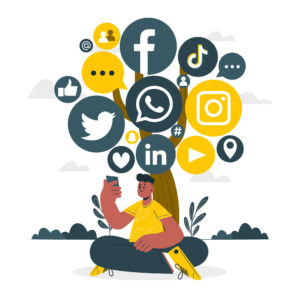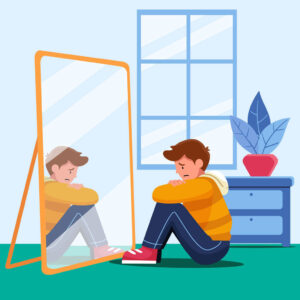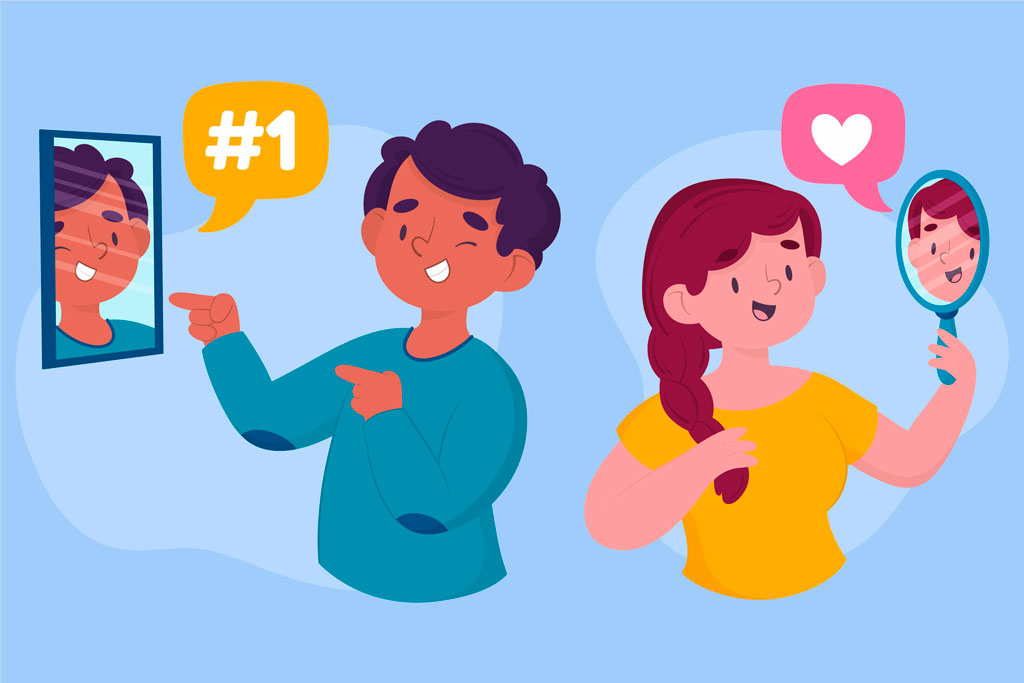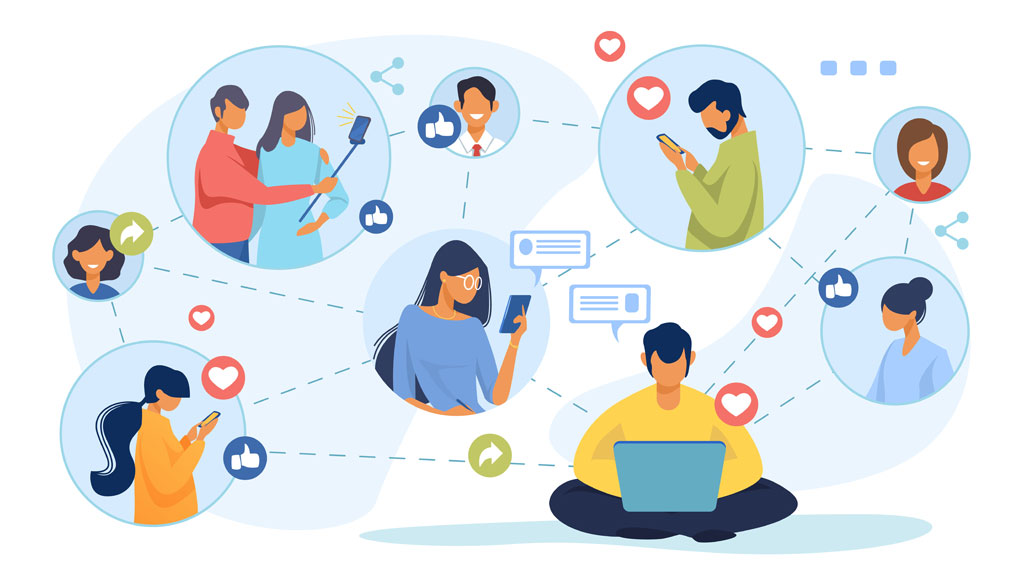The new generation is growing up with new technology and social networks such as Snapchat, Twitter, Instagram and Facebook, which are part of the common means of communication to exchange with friends. What do teenagers love most? Take pretty pictures to post them on their accounts, but not in any way! Selfies must sublimate, thanks to the various filters that smooth the skin, reduce the size of the nose, enlarge the look or make the complexion perfect. Except that in reality, young people may no longer accept their own appearance.
Table of Contents
Social media plays a significant role in our lives. Even those who were more reluctant a few years ago have found a platform that works for them. In fact, most adults aged 18 to 24 connect to a social network every day. Both young and old use them to socialize and learn. The advantages are many, but so are the disadvantages as well.
 Social networks are sites on the internet that allow us to connect. Basically, they allowed us to communicate with distant people, to rediscover contact with people we no longer saw. A little later, these networks made it possible to be informed, open up to the world, and develop one’s creativity and spirit.
Social networks are sites on the internet that allow us to connect. Basically, they allowed us to communicate with distant people, to rediscover contact with people we no longer saw. A little later, these networks made it possible to be informed, open up to the world, and develop one’s creativity and spirit.
If you have Instagram, Snapchat or Facebook accounts yourself, and you may have noticed that social networks are full of so-called perfect photos. This is because most people post “looking good” photos of themselves, and those photos don’t show their physical flaws but give the impression that they are always in a good mood. What’s more, you could dive into a sea of videos that vary from food, health, and business to education through social platforms. Therefore, your life will be filled with social media videos and you may become addicted to video.
What is Self-Esteem
To study the subject well, it is better to define the components clearly. Self-esteem is how you see yourself and whether you like what you see or not. It is also a combination of self-love, self-vision and self-confidence. Self-esteem is very important in human beings, and it’s a kind of our fuel. When there is no more fuel in a car, the car does not move forward. It is the same with man.

When a person has very low self-esteem, they no longer take action and therefore no longer move forward. Worse, a total lack of self-esteem can bring stress, depression, and attempted suicide. As you can imagine, it is better to have high self-esteem but beware that too much is the enemy of the good, like any ingredient. Having too high self-esteem (being narcissistic) can also be fatal to you.
There are three components to self-esteem, the main one being physical appearance. Indeed, even if it is not just about our body, it is still a “showcase” and what others perceive first.
Another aspect is the feeling of popularity, that is to say, the feeling that I have of being appreciated by others and of having my place with them. But here again, we can see the damage that social networks can cause by amplifying the phenomenon of social judgment.
Finally, the third dimension of self-esteem refers to skills. For example, if I am good at sports or have a particular artistic talent, I will feel valued.

How to Promote Self-Esteem among Children
Experts believe that self-awareness starts in children between the ages of 4 and 6, and this is indeed the moment when the child begins to wonder how classmates and other children look at them. As with everything, parents set an example for children. They may wonder at first how much attention they pay to their appearance, how much time they spend in front of the screens, or even how they manage conflicts, failures, etc.
In addition, it is necessary to be attentive to the emotional state of his child because often, the parents underestimate their uneasiness. In addition, you can explain to your teenager that it is normal to want to please, take care of his appearance, and want to make friends, reminding him that he also has skills and that one should not abuse the virtual.
However, it is not enough to tell him that he is beautiful and exceptional at the risk of him becoming narcissistic but to remind him that he is also courageous and intelligent. Encourage him in various areas, and finally, confide in him. Talking to him about the problems you may have had at his age will help him realize that he is not alone in experiencing these uncertainties and that nothing is final.

1. It is the social comparison that is worrying
We never judge our value in absolute terms, but we always judge it concerning what others have and what they do. Result: we keep comparing ourselves to our body, our clothes, our diplomas, our culture, etc. It is a natural mechanism nestled in the heart of our brains, and it would even be “illusory” to hope never to compare ourselves to others.
It should be noted that social comparison begins in kindergarten and primary school, during the first socializations, with the desire to belong to a group. Consequently, when a teenager is rejected on the internet, we then speak of “cyber-ostracism” because this social and virtual rejection is as painful – if not more – than the real expulsion from a group, in particular from the because of the more significant number of people who witness this exclusion. We are witnessing a digitization of our lifestyles. The problem is that these comparisons are misleading on social networks and work against us!
One out of two young girls in the world has a negative image of herself. However, you have to go beyond appearances to feel good about yourself. And that comes with good self-esteem. The problem is that our society constantly pushes us to compare ourselves to others, especially via social networks. It then becomes essential to educate children early to give them self-confidence. This dimension of self-esteem is vital in the psychological balance of children, adolescents, and even adults. Self-esteem, which is the synthesis of how we view and judge ourselves, has repercussions on our emotional well-being and our behavior, depending on how we judge ourselves.
2. We are witnessing a digitalization of our lifestyles
On Instagram, for example, we scroll through photos of our friends or stars who show themselves in their best light (people appear in good shape, surrounded by friends, on vacation or in the evening, etc.). The other question posed by social networks is the worsening of social approval (the obsession with having likes, followers, etc.). This is why it is essential to educate the citizens of today and tomorrow to be vigilant of the lies conveyed by social networks, which influence teenagers’ self-esteem.
In addition, studies have shown that young people who frequent social networks the most are more prone than others to social anxiety and depression. And conversely, social networks tend to attract the most vulnerable young people.
3. The dangers of comparing yourself to an embellished reality
By being constantly exposed to glamorous images of movie stars, or their favorite influencers, retouched portraits, travel photos or flamboyant outings, teenagers who may already have low self-esteem are at risk of becoming more compared to a distorted reality and suffer the repercussions. In addition to feeling the need to embellish their own online image, they may experience sadness, envy, or even resentment. In some cases, this could damage their self-confidence and self-image, not only on social media but also, above all, in everyday life.
Some young people who actively publish content on these platforms may feel the need to multiply the steps to produce catchy publications in order to obtain always more “likes.” This relentless quest for approval can, in some cases, become a source of stress and anxiety for young people.
4. When social media interferes with lifestyle
While giving the impression of being connected with a crowd of people, social media can also contribute to feelings of isolation. In some cases, overuse can even impinge on more meaningful relationships. In some young people, they can also have repercussions on lifestyle habits, including sleep, and even lead to addiction.
5. Risks of personal attacks and intimidation
Social media can be a source of empowerment for teenagers who experience some success there. However, they also expose themselves to the risk of derisive comments, personal attacks and even intimidation.
6. Impact on relationships and social skills
If social networks make it possible to establish relationships in quantity, the latter is not necessarily synonymous with quality. Some researchers suggest that obsession with the online social world diminishes the quality of healthy face-to-face relationships.
Indeed, in “offline” relationships, a large part of the information is transmitted through non-verbal communication (tone of voice, easy expression, posture, eye contact, etc.) Online, these indices are disturbed or even interrupted. We have less information to interpret things correctly. But it is essential to build positive relationships, essential to our balance. And even if the use of emojis partially fills this gap, it remains wholly insufficient.
7. The social comparison effect
The major media now regularly report on it. One of the dangers of social networks is considering the content offered there as a faithful transcription of reality. However, whether it is friends or, even more so, influencers, the content shared on the networks is most of the time filtered and constructed to be flattering. All this promotes social comparison. And this can foster envy, jealousy, resentment, or self-deprecation. The content consulted brings us back to our situation. We can then feel less happy, accomplished and accomplished compared to what others show us.
Nevertheless, if it turns into inspiration or admiration, it can fuel personal growth. It is nevertheless necessary to have sufficient perspective, to show self-compassion and to be part of a proactive approach to derive such benefits from the use of social networks. This is why dissatisfaction still seems to dominate in the studies
8. Impact on body image and self-esteem
Via the social comparison effect that we have just discussed, it is even self-esteem that the use of social networks can degrade. Several studies in adolescents and adults have thus identified a correlation between the use of social networks and low self-esteem.
Social networks would promote ascending social comparisons (the fact of comparing ourselves to people we perceive as superior to us) and would generate negative emotions. As what is shared on social networks is rarely an unfiltered representation of reality, the resulting social comparison is therefore based on inappropriate and inaccessible evaluation reference systems.
A Matter of Balance
Ultimately, social media can be a great way to develop, maintain, and strengthen social online and offline connections. You just have to be careful not to go overboard. All that the complete works on the subject tell us is that the negative impact of social networks on well-being is rather very weak. The latter, therefore, probably has an indirect role in personal development, which can be as negative as positive depending on the circumstances.
When it comes to productivity, the link between email, apps, social media, and efficiency follows a curve that looks an inverted. The right level of use makes you more productive, but it’s quite easy to end up with an excess. Knowing that the average use of a smartphone is around 160 minutes per day, it is above all the excessive notifications and consultations of the various networks that disturb the concentration rather than the intrinsic nature of the services used.
Conclusion
Social networks are services that are not bad or positive. Certainly, tech giants have long relied on cognitive psychology and neuroscience research to vampirize our attention. Nonetheless, from Twitter to TikTok, it’s still possible to use each app for better or worse. Taking a step back often makes it possible to establish a healthier relationship with these networks and to exploit them for positive results. They can be the origin of beautiful encounters, instructive exchanges and inspiring discoveries. It is even possible to deepen or maintain relationships that, without them, would have crumbled.
So learn to rely on the networks when it brings you positive, whether via the best-known platforms or through community tools such as forums or discord servers. And don’t forget to grow your relationships offline whenever possible. If there is anything that recent confinements have taught us, these two approaches are complementary!
